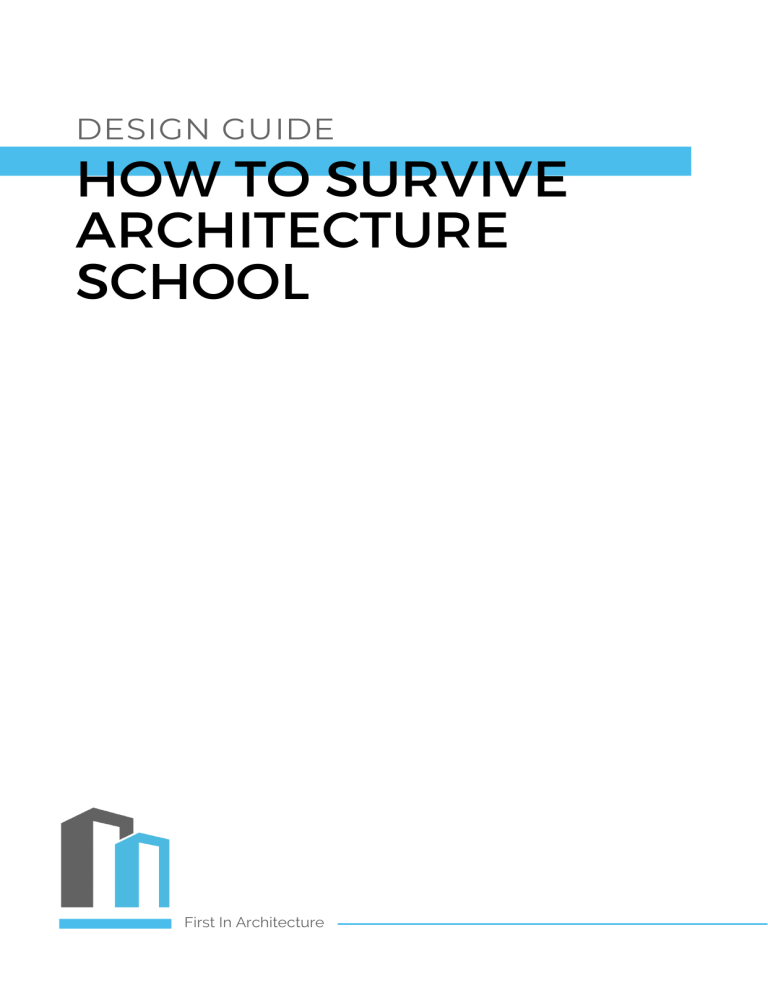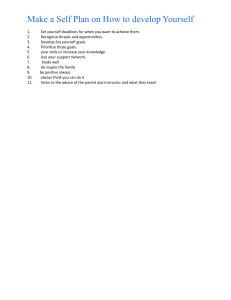
DESIGN GUIDE HOW TO SURVIVE ARCHITECTURE SCHOOL First In Architecture HOW TO SURVIVE ARCHITECTURE SCHOOL From FIRST IN ARCHITECTURE 18 Tips to help you succeed and excel in your architecture studies A lot of us know that studying architecture is tough. If you have chosen to pursue a career in architecture, you have to be pretty committed to the cause. Studying architecture is not an easy option, that’s for sure. Having said that, going to university or college to pursue an architectural education, can be fulfilling, character building, and can set you on a path to a rewarding career. The following list is in no particular order - just a lot of tips, thoughts and ideas to help you be successful in your architecture studies. 1. Time management For me, time management is one of the most important aspects of any working life. Being able to manage your time and get things done is a great skill to work on. When you approach your assignments dissect the project - look at the end date and work backwards and figure out what you need to do and when, in order to successfully complete your project on time. Break it down and work on small sections of the assignment in order to reach the end goal. Every project has a structure, along with a selection of tasks, required output, perhaps intermediate submissions or presentations. All of this information you are provided with will give you the ability to structure your tasks and do what is necessary to complete each task. Start your projects immediately, don’t put things off. Part of managing your time, is making sure you use your time efficiently. If you have a project due in two weeks, start it as soon as it is issued to you. Maximise the time available to you to complete the task. 2. Take care of yourself Eat well. Be healthy. Take a break. Sleep. Go for a run. Take a look at some of the most successful entrepreneurs. They often have strong personal goals with a very focussed mindset that often includes exercise, meditation and time away from work, allowing them to achieve more. When your body is healthy, your mind can be healthy too and you will be more able to focus on your work without distraction and create your best work. It has been shown that the brain responds strongly to aerobic exercise and can improve memory, help you focus and stay on task. Physical activity also has positive effects on your mood, while yoga can help reduce stress levels. Being and feeling healthy will improve self esteem, keep you confident and your mind sharp. Your positive attitude will permeate into your projects and presentations demonstrating your enthusiasm for the subject. firstinarchitecture.co.uk 1 of 4 3. Don’t pull all nighters If you manage your time, you will not need to work through the night to get your projects completed. You don’t think or perform well when you have sleep deprivation. All nighters are a result of procrastination, poor time management and not being able to prioritise. People see all nighters as a badge of honour. I strongly disagree with this idea, which seems to continue through into the workplace where staff are often expected to work long hours and forget about a healthy life work balance. It is no wonder that architects are likely to suffer with mental health issues, according to a recent article by the RIBA, when this work ethic is considered to be acceptable. I am all for working hard, but doing so in a productive, efficient manner will enable to you to have a life outside of study and work, allowing you to achieve a better state of health and well being. 4. Learn to prioritise Similar to time management, but it is also about learning what is important to you in order to get through your studies and do well. Unfortunately you need to learn to say NO! This can go right down to the requirements of an individual project. If you know how much of your grade will be on each part of the assignment, you can prioritise and figure out what needs more of your time. A mistake often made by students is that they focus on the bit they enjoy, and ignore the rest or put it to the bottom of the list. Take some time to fully understand and read the brief, in order to figure out exactly what is required. Develop a plan and make sure there is a good balance between input and output. 5. Make yourself hireable Think ahead, what is going to happen when you get to the other side and start looking for a job. You need to make sure you have the best opportunity to gain employment. How? Get some work experience. Internships, work experience, anything that will help you develop and get exposure to professional life and practice. If you are struggling, think of an engineering office, different types of experience, construction experience on site, working for a manufacturer - anything you can get that relates to architecture and construction will be a positive experience and will look good on your CV. It is more likely a practice will want to hire you if you have had some kind of professional experience giving them the confidence that you will be able to slot into their working environment more easily than someone with no or little experience. 6. Learn to draw Drawing is a skill. Some of us are better than others - but we can all improve. Take the time to practice, practice, practice. The satisfaction of being able to confidently sketch out an idea in 3d will be well worth the hours it has taken you to get there! Develop your skill, and your style. 7. Listen Listen to the people around you, both your colleagues and tutors, professors and anyone else from the architectural field. You can learn from everyone - keep your ears open and take on board what people are saying. It is valuable. firstinarchitecture.co.uk 2 of 4 8. Don’t let it take over your world Get some perspective here. Sometimes during your studies it seems like the world will end imminently if you don’t finish drawing up another elevation, or stick that piece of balsa wood to your model. But really, its just architecture, try not to take it all TOO seriously. Remember that things could be worse. Have some fun once in a while. Go out, do something different, take up a hobby, learn a new skill - all this will make you a more rounded architect. 9. Learn how to speak in public During your studies, and onward into your career, you will have to stand up and present your work to people. There is generally no avoiding it. So, get used to it. Practice putting together presentations, and practice talking confidently in front of people. Some of us are naturals, and many of us are not. It comes in time, practice makes perfect! 10. Save time for your presentation Following on from the point above it is really important to learn how to tell the story of your project. There is no use spending hours creating a solid design, working up some excellent drawings, and building a detailed model if you can’t stand up and coherently talk about your design. Make sure you save time to develop a strategy for the crit, how you will present your work, how you will communicate your story. Take your time, don’t forget that most people are seeing this for the first time. Make it clear, be confident, explain yourself, tell a story. 11. Respect Respect your tutors, professors and anyone taking the time to try and help you learn and gain new skills. Also, respect your fellow colleagues, especially when they are in the middle of a crit or presentation! Everyone is entitled to an opinion, listen, be kind and show respect. 12. Network Get to know people in the industry. Whether its becoming a student member of an association or organisation, or getting involved with local architecture events, get yourself out there and get to know people. Not only does it bring another dimension of people for you to learn from and engage with - you never know if one of your new associates may help you into some work experience or your new job when you graduate. 13. Embrace criticism Working in a creative industry is bound to come with its critics. This, of course, is the case with architecture. During your studies there will be plenty of times when your ideas may be criticised or your entire project could be slammed - don’t take it personally. Don’t forget that architecture is subjective, and everyone will have a different opinion on your project. Learn from what people are saying and move on. Constructive criticism will allow you to improve and become a better architect. Embrace it! 14. Ask questions, and ask for help Make the most of the opportunity to ask questions and learn as much as you possibly can. Don’t be afraid to look stupid, you are at college/university - you are there to learn! If you are unsure, seek out help - ultimately this will enable you to be the best you can be. When you are firstinarchitecture.co.uk 3 of 4 confused, ask for help - that is why you are at college/university. If you knew it all already, there would be no point you being there. 15. Take your education into your own hands Your architecture curriculum cannot teach you everything you need to know about architecture - take some time to do some self teaching. Whether it is watching documentaries or catching up on some software tutorials, an another skill to your set and put yourself ahead of the game. 16. Read Absorb as much as you can about the industry. Spend time in your library, read books, journals anything that will give you a broader understanding of the subject. It will go a long way. 17. Be creative Sounds obvious, but…. this is possibly the only time you get to design without constraints, without budgets, clients and all the other things that get in the way! Make the most of your freedom and be experimental, be creative. 18. Don’t give up As I said in the beginning, its not going to be easy - but you knew that already. Keep on keeping on, work hard, do your best, and don’t give up. You’ll get there. Read the original post here: http://www.firstinarchitecture.co.uk/how-to-survive-architecture-school/ firstinarchitecture.co.uk 4 of 4






